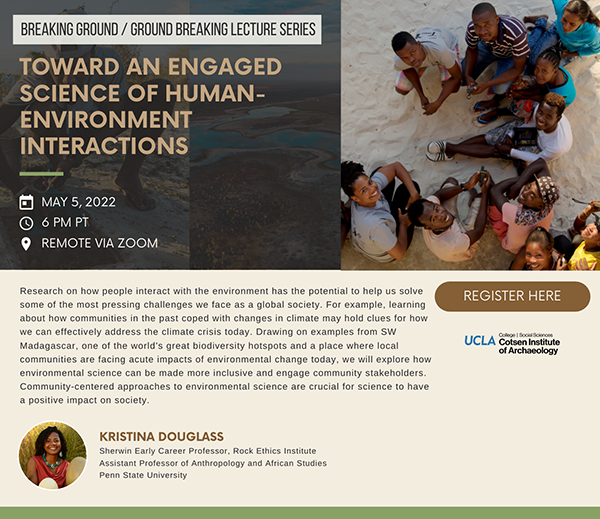Past Events
Interested in Cotsen events? Sign up for our mailing list.Dr. Zoila Mendoza
Department of Native American Studies, UC Davis
Tuesday May 24th, 3pm PT

Contact Elyse Brusher
Email ebrusher@ucla.edu
Phone
Claudio Cancino
Architect, Architectural Conservator | MBA | MS
Senior Project Specialist, Building and Sites department, Getty Conservation Institute
The community of Kuñotambo, a small village near Cusco, Peru has been a crucial and significant stakeholder for the conservation of its church of Santiago Apóstol. Thanks to them, their church was seismically retrofitted and is now maintained as a case study for similar sites in the region.
The church is one of the four case studies of the Seismic Retrofitting Project, a collaborative project between the Getty Conservation Institute and the Ministry of Culture of Peru. The SRP aims to design, test and model seismic retrofitting techniques suitable to earthen buildings using low-tech materials and local expertise.
The construction documents for the seismic retrofitting of the church were developed by the GCI and the Ministry of Culture of Cusco; where the SRP designed retrofitting techniques were implemented. The construction phase started in 2016 and the church was inaugurated in 2019.
This contribution will explain the importance of the involvement of local communities for the conservation and maintenance of their heritage.
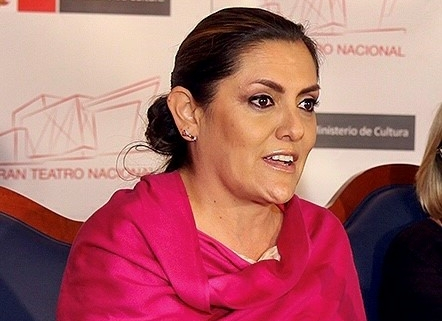 Claudia Cancino is a licensed architect from Peru and manages the Getty Conservation Institute Earthen Architecture Initiative which has three components: The Seismic Retrofitting Project in Peru, the Earthen Architecture Course in Al-Ain, Abu Dhabi and the Terra 2021 Congress in Santa Fe, New Mexico. She also manages the Retrofitting and Repair Component of the Bagan Conservation Project. She earned a certificate in conservation at ICCROM in Rome, followed by graduate diploma in business administration at ESAN in Lima. She practiced preservation architecture and has taught Earthen Conservation at several universities. She earned a Master of Science in Historic Preservation and an advanced certificate in conservation from the University of Pennsylvania.
Claudia Cancino is a licensed architect from Peru and manages the Getty Conservation Institute Earthen Architecture Initiative which has three components: The Seismic Retrofitting Project in Peru, the Earthen Architecture Course in Al-Ain, Abu Dhabi and the Terra 2021 Congress in Santa Fe, New Mexico. She also manages the Retrofitting and Repair Component of the Bagan Conservation Project. She earned a certificate in conservation at ICCROM in Rome, followed by graduate diploma in business administration at ESAN in Lima. She practiced preservation architecture and has taught Earthen Conservation at several universities. She earned a Master of Science in Historic Preservation and an advanced certificate in conservation from the University of Pennsylvania.
Contact Céline Wachsmuth
Email wachsmuthc@g.ucla.edu
Phone
You are cordially invited to The Vishap: From Fairy Tale to Reality (click on link for schedule)
Sunday May 15th, 2022 at 2:00 - 6:00pm PDT
The Narekatsi Chair in Armenian Studies presents "The Vishap: From Fairy Tale to Reality," by Dr. Arsen Bobokhyan. This event is co-sponsored by the Promise Armenian Institute, the Ararat-Eskijian Museum, and the National Association for Armenian Studies & Research with the participation of the Research Program in Armenian Archaeology and Ethnography at the Cotsen Institute of Archaeology and the Institute for Archaeology and Ethnography of the Armenian Academy of Sciences.
2:00 - 3:30 PM Royce Hall 314
Illustrated Lecture on documenting and preserving the dragon-stones of Armenia from the 2nd millennium BCE by Dr. Arsen Bobokhyan (PI of this project and Director of the Institute of Archaeology and Ethnography in Yerevan), followed by a documentary of the dragon-stones and the initial phase of their investigation and restoration.
3:30 - 6:00 PM Powell Rotunda
Presentation of Dr. Bobokhyan's latest monograph Atrpet’s “Scientific Adventures” and Discovery of the Vishap Stelae (in Armenian), followed by a guided tour of an exhibit of thirty high-resolution images of the dragon-stones by Dr. Bobokhyan and recital by the UCLA Armenian Ensemble. The event will conclude with a Wine and Cheese Reception.
The event will livestream on the Ararat-Eskijian Museum's Facebook and YouTube pages.
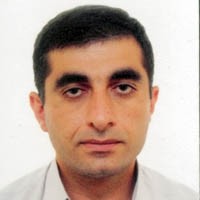 Arsen Bobokhyan is Directory of the Institute for Archaeology and Ethnography of the Armenian Academy of Sciences. He received his Ph.D. from the Institute of Prehistory at the University of Tuebingen (2008) and has since been an Asst. Professor of History at Yerevan State University and Lecturer at the American University of Armenia. The author of three books and over a hundred articles, he has served as editor of a number of scholarly journals and has been invited as visiting professor at several universities in the German-speaking world. His research interests include the early Archaeology of the Armenian Plateau and the Caucasus, the Near East and Asia Minor, Cultural Relations, Ancient Barter and Weight Systems and Religion and Cult.
Arsen Bobokhyan is Directory of the Institute for Archaeology and Ethnography of the Armenian Academy of Sciences. He received his Ph.D. from the Institute of Prehistory at the University of Tuebingen (2008) and has since been an Asst. Professor of History at Yerevan State University and Lecturer at the American University of Armenia. The author of three books and over a hundred articles, he has served as editor of a number of scholarly journals and has been invited as visiting professor at several universities in the German-speaking world. His research interests include the early Archaeology of the Armenian Plateau and the Caucasus, the Near East and Asia Minor, Cultural Relations, Ancient Barter and Weight Systems and Religion and Cult.
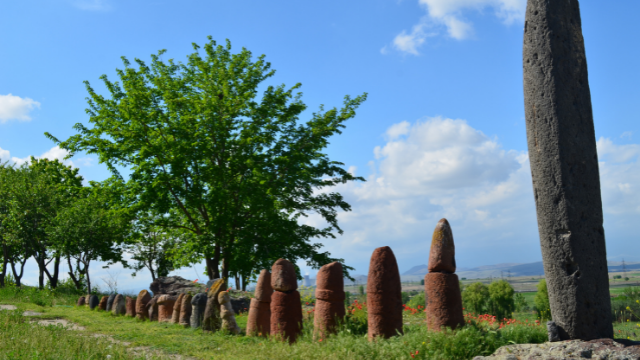
Vishapakar (Photo: Sonashen via Wikimedia Commons, 2013; cropped. CC BY-SA 3.0)
Contact Kristine Martirosyan-Olshansky
Email kristineolsh@ucla.edu
Phone
Jeremy Mikecz
Neukom Institude Postdoctoral Fellow
Native American Studies, Darmouth University
In-person, Digital Archaeology Lab, Fowler A163
Thursday May 12th, 2022 from 10am-1pm PT
Data visualizations and mapping carry with them some baggage. Graphs lie. Maps hide. Politicians, corporations, and others use them to persuade (at best), or deceive or divide (at worst). However, just as the earliest maps were simply tools intended to help us locate our place in the world, qualitative, humanistic visualization allows us to more systematically interrogate historical narratives, construct alternative narratives, and compare the difference between the two. In this hands-on workshop, Dr. Jeremy Mikecz introduces participants to inspiring examples of visualizations that reveal rather than conceal human stories. He also offers a tutorial demonstrating simple methods for producing similar visualizations in the free, open-source program Inkscape. Participants will have the opportunity to create their own qualitative, humanistic, or narrative visualization by the end of the workshop.
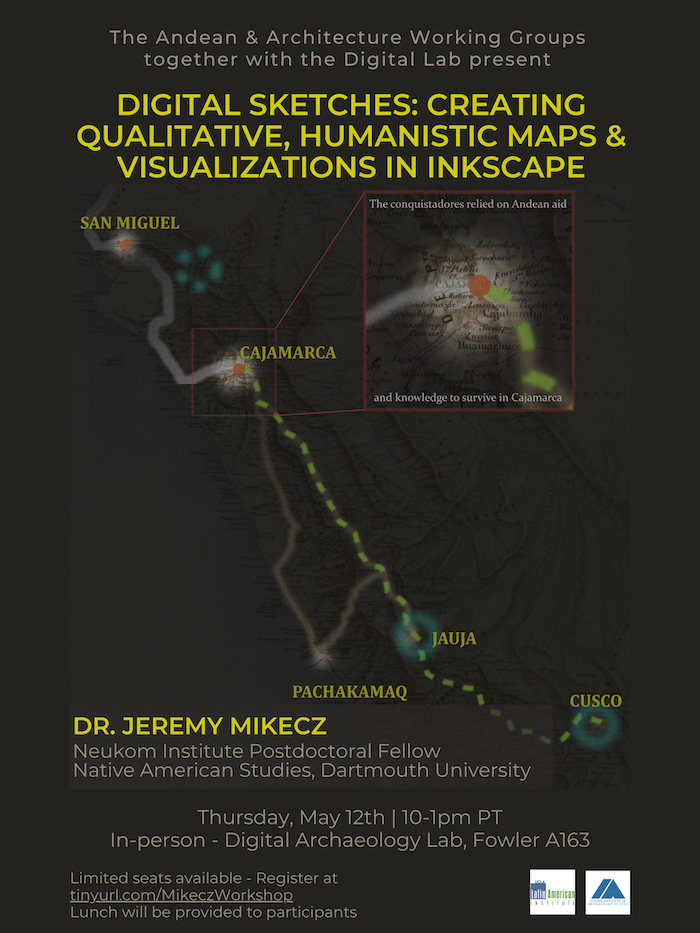 Sponsored by the Cotsen Institute of Archaeology and UCLA Latin American Institute
Sponsored by the Cotsen Institute of Archaeology and UCLA Latin American Institute
Contact Alba Menéndez Pereda & Rachel Schloss
Email albamenendez@ucla.edu & rachelschloss@g.ucla.edu
Phone
Jeremy Mikecz
Neukom Institude Postdoctoral Fellow
Native American Studies, Darmouth University
Wednesday May 11th, 2022 at 4pm PT
Register here (Link for both in-person and Zoom attendance)
How can patterns embedded in historical texts be made visible? How can we map texts and visualize narratives? How does doing so allow us to confront historical silences and challenge scholarly erasures in new and productive ways?
In this presentation, the historian Dr. Jeremy Mikecz will discuss how he answers these questions through the integration of digital mapping and qualitative visualization as well as the close reading of Spanish and Indigenous texts. In doing so, he will show how qualitative, humanistic, and narrative visualization can complement more traditional ethnohistorical approaches to historical recovery. His talk will explore his work on two separate, but related research projects. First, he will describe how he develops or adapts new methods, borrowed from experimental cartography, literary geography, and even data science, to re-imagine the Spanish invasion of the Inka Andes (1530s AD). Drawing from his forthcoming book, Mapping Conquest, Mikecz recovers an alternative history of the so-called “conquest” by rendering the gaps and silences of colonial texts visible, thus showing what colonial authors worked hard to conceal. It then fills in those gaps by tracing and mapping Indigenous activity—as recorded in Indigenous texts—thus re-animating the contributions of Andean actors to the creation of the colonial world. In doing so, it shows how long-term Indigenous histories, politics, and geographies shaped events of the period in ways that Spanish authors could not comprehend.
Second, Mikecz will share his preliminary efforts to create a digital "database" of some of the most foundational historical texts written in or about the Andes of the 16th and 17th centuries. Digitizing and encoding these texts using xml will then allow them to be searched and queried in sophisticated ways. The goal is to post this searchable text corpus or "database" online for use by students and scholars in the Americas and beyond.
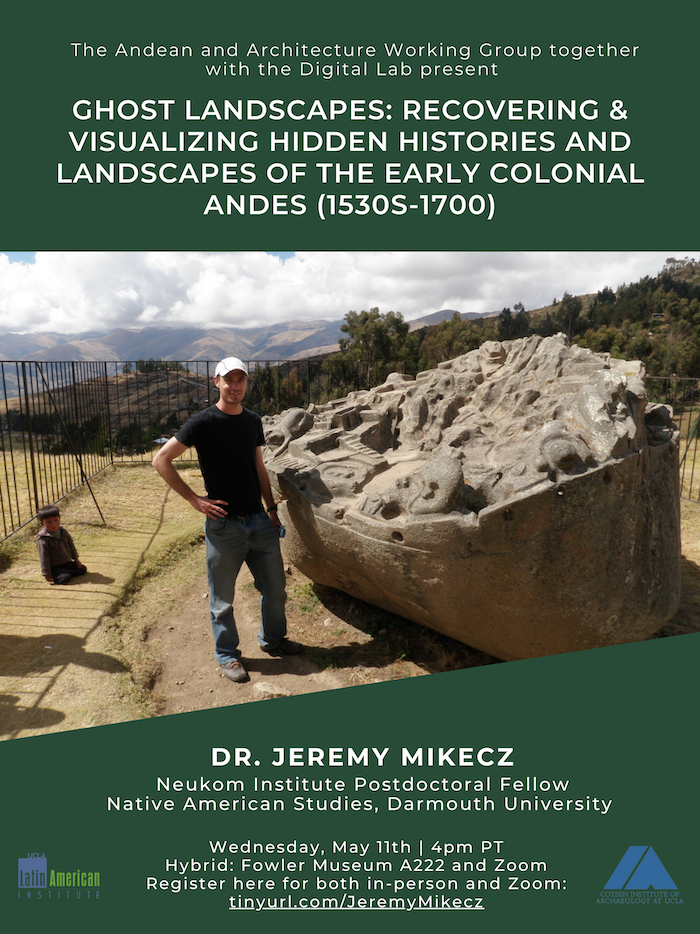
Sponsored by the Cotsen Institute of Archaeology and UCLA Latin American Institute
Contact Alba Menéndez Pereda & Rachel Schloss
Email albamenendez@ucla.edu & rachelschloss@g.ucla.edu
Phone
Kristina Douglass, Sherwin Early Career Professor in the Rock Ethics Institute and Assistant Professor of Anthropology and African Studies
Research on how people interact with the environment has the potential to help us solve some of the most pressing challenges we face as a global society. For example, learning about how communities in the past coped with changes in climate may hold clues for how we can effectively address the climate crisis today. Drawing on examples from SW Madagascar, one of the world’s great biodiversity hotspots and a place where local communities are facing acute impacts of environmental change today, we will explore how environmental science can be made more inclusive and engage community stakeholders. Community-centered approaches to environmental science are crucial for science to have a positive impact on society.
Kristina Douglass
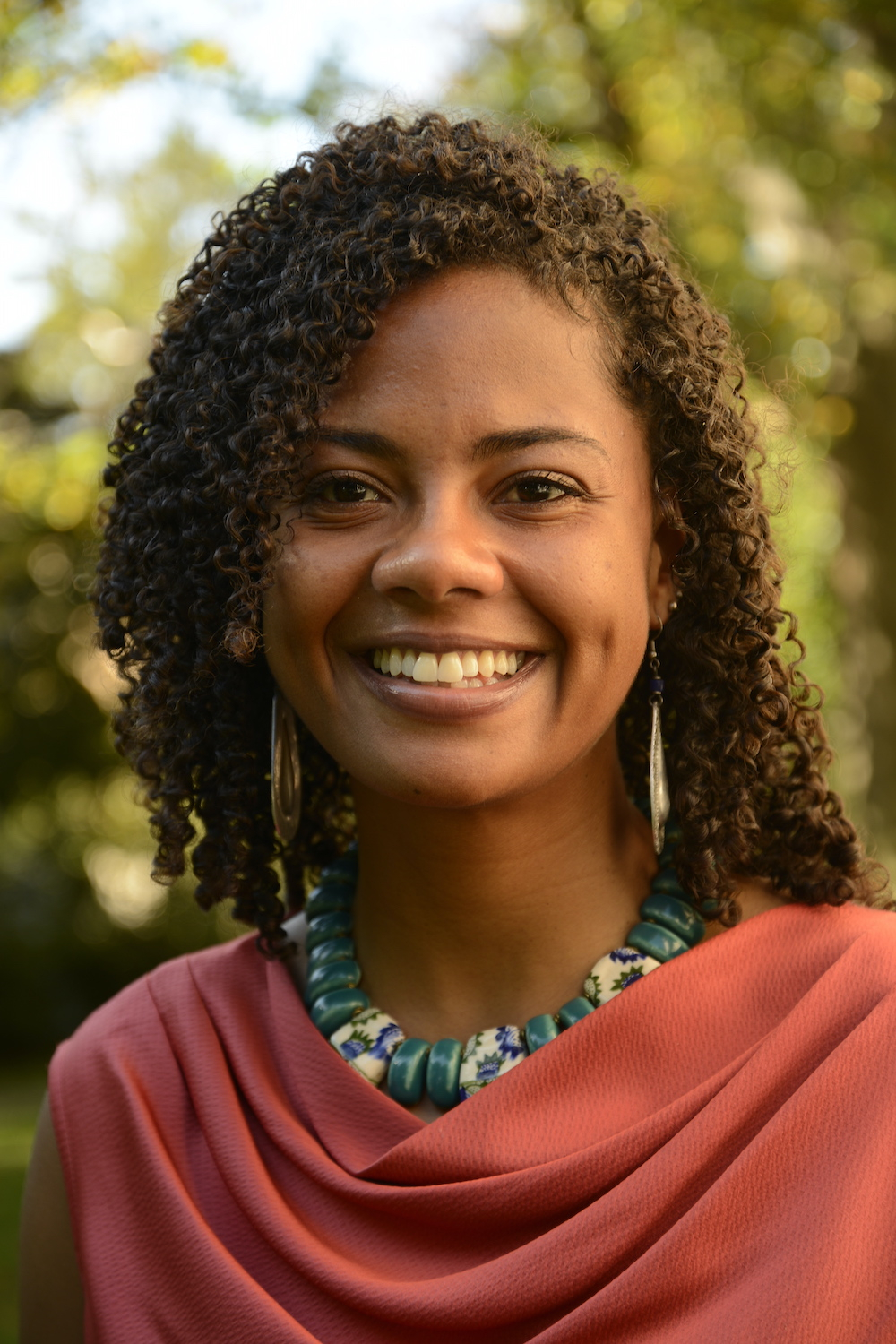 Kristina Douglass is an archaeologist who investigates how people, land-and seascapes co-evolve. She is the Joyce and Doug Sherwin Early Career Professor in the Rock Ethics Institute and Assistant Professor of Anthropology and African Studies at Penn State University. Sheis a Penn State Institutes for Energy and the Environment co-funded faculty member and a faculty affiliate of the Institute for Computational and Data Sciences. Douglass is also a Smithsonian Institution Research Associate. Her work is grounded in collaborations with local, Indigenous, and descendant (LID) communities as equal partners in the co-production of science, and the recording, preservation and dissemination of LID knowledge. Douglass and her collaborators aim to contribute long-term perspectiveson human-environment interactions to public debates, planning and policymaking on the issues of climate change, conservation, and sustainability. Since 2011 Douglass has directed the Morombe Archaeological Project (MAP), based in the Velondriake Marine Protected Area. This territory is home to diverse LID communities, including Vezo fishers, Mikea foragers and Masikoro herders. The MAP team is made up of Velondriake LID community members, and an international group of graduate students and postdoctoral researchers. The MAP is anchored at Penn State to the Olo Be Taloha Lab (@OBTLab andhttps://obtlab.la.psu.edu) for African Environmental Archaeology, which Douglass also directs. Douglass is a mother, singer, dancer, Capoeirista, SCUBA diver and avid gardener, all of which intersect in essential ways with her work as an archaeologist.
Kristina Douglass is an archaeologist who investigates how people, land-and seascapes co-evolve. She is the Joyce and Doug Sherwin Early Career Professor in the Rock Ethics Institute and Assistant Professor of Anthropology and African Studies at Penn State University. Sheis a Penn State Institutes for Energy and the Environment co-funded faculty member and a faculty affiliate of the Institute for Computational and Data Sciences. Douglass is also a Smithsonian Institution Research Associate. Her work is grounded in collaborations with local, Indigenous, and descendant (LID) communities as equal partners in the co-production of science, and the recording, preservation and dissemination of LID knowledge. Douglass and her collaborators aim to contribute long-term perspectiveson human-environment interactions to public debates, planning and policymaking on the issues of climate change, conservation, and sustainability. Since 2011 Douglass has directed the Morombe Archaeological Project (MAP), based in the Velondriake Marine Protected Area. This territory is home to diverse LID communities, including Vezo fishers, Mikea foragers and Masikoro herders. The MAP team is made up of Velondriake LID community members, and an international group of graduate students and postdoctoral researchers. The MAP is anchored at Penn State to the Olo Be Taloha Lab (@OBTLab andhttps://obtlab.la.psu.edu) for African Environmental Archaeology, which Douglass also directs. Douglass is a mother, singer, dancer, Capoeirista, SCUBA diver and avid gardener, all of which intersect in essential ways with her work as an archaeologist.
Contact Michelle Jacobson
Email mjacobson@ioa.ucla.edu
Phone
A Conversation with Dr. Judith F. Baca on the creation, impact and conservation of the Great Wall of Los Angeles
"Standing at the river’s edge, I saw the concreted arroyos as scars in the land. I dreamed of a “tattoo on the scar where the river once ran,” and an endless narrative that would recover the stories of those who were disappeared along with the river. How could we recover the memory recorded in the land? This began my years of working with more than 400 youth and hundreds of descendants of the original peoples in the Los Angeles River, recovering, through the creation of visual histories, all that had disappeared. Through our ongoing narrative work,The Great Wall of Los Angeles, we are attempting to heal both the river and the people. Currently measuring one half-mile, [and expanding to a full mile] The Great Wall is an evolving chronology of memory from the land recorded with our hands and paint, and now flowing along the river where it all began."- Judith F. Baca.
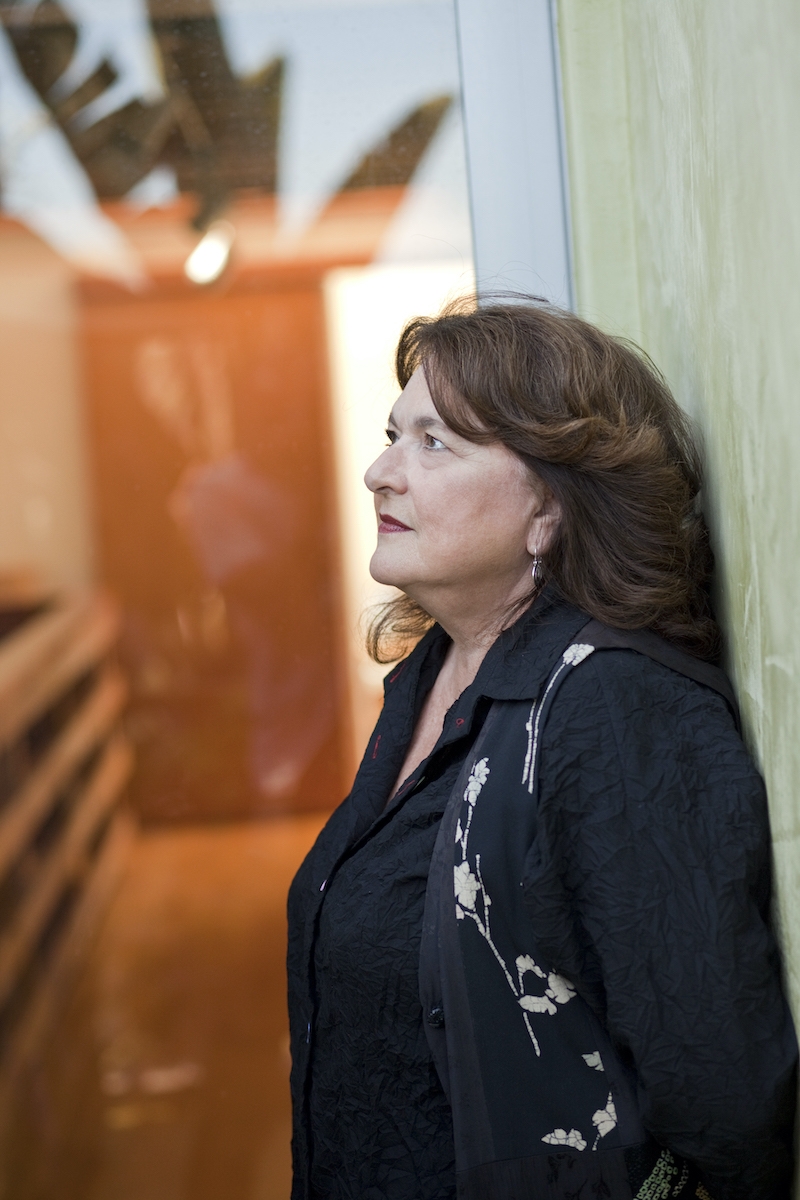 One of America’s leading visual artists, Dr. Judith F. Baca, has created public art for four decades. Powerful in size and subject matter, Baca’s murals bring art to where people live and work. In 1974, Baca founded the City of Los Angeles’ first mural program, which produced over 400 murals, employed thousands of local participants, and evolved into an arts organization – the Social and Public Art Resource Center (SPARC). She continues to serve as SPARC’s artistic director while also employing digital technology in SPARC’s digital mural lab to promote social justice and participatory public arts projects.
One of America’s leading visual artists, Dr. Judith F. Baca, has created public art for four decades. Powerful in size and subject matter, Baca’s murals bring art to where people live and work. In 1974, Baca founded the City of Los Angeles’ first mural program, which produced over 400 murals, employed thousands of local participants, and evolved into an arts organization – the Social and Public Art Resource Center (SPARC). She continues to serve as SPARC’s artistic director while also employing digital technology in SPARC’s digital mural lab to promote social justice and participatory public arts projects.
Beginning with the awareness that the land has memory, Baca creates art shaped by an interactive relationship of history, people, and place. Her public artworks focus on revealing and reconciling diverse peoples’ struggles for their rights and affirming the community’s connections to place. Together with the people who live there, they co-create monumental public art places that become “sites of public memory.”
In 2012, the Los Angeles Unified School District named a school the Judith F. Baca Arts Academy, located in Watts, her birthplace. She is a recipient of the Guggenheim Fellowship, the United States Artist Rockefeller Fellowship, and the Andrew W. Mellon Foundation Grant awarded for the expansion of the Great Wall.
Contact Michelle Jacobson
Email mjacobson@ioa.ucla.edu
Phone
Dr. Stephen E. Nash
Director of Anthropology and the Avenir Conservation Center
Denver Museum of Nature and Science
Thursday, April 28 at 12:00pm PT
Hybrid event – In-person at A222 Fowler and Online (Zoom)
The Cotsen Institute of Archaeology invites you to a special talk presented by the Waystation Program:
During the last two decades, increasing awareness of the frequently illicit origin of archaeological objects has resulted in changes to acquisition policies in American museums. In addition, many museums are re-evaluating the ethics of collecting and working with indigenous communities to return or reinterpret sensitive cultural heritage. For more than 15 years, the Denver Museum of Nature & Science has taken a leadership role in repatriation and international returns by going above and beyond the letter of the law(s), using the principles of justice, dialogue, reciprocity, and respect to guide their activities. This talk examines the museum’s success, and occasional failure, through a series of case studies: the return of 30 vigango (ancestral grave posts) to the Mijikenda tribes of coastal Kenya, and shrunken heads to the Shuar-speaking peoples of Ecuador; the reburial of non-Native human remains in Crestone, Colorado; and the repatriation of Native American ancestors to numerous Tribal Nations in the U.S. The new Avenir Conservation Center is focused on inclusive conservation guided by source communities and may one day include a formal program to facilitate international returns and repatriations.
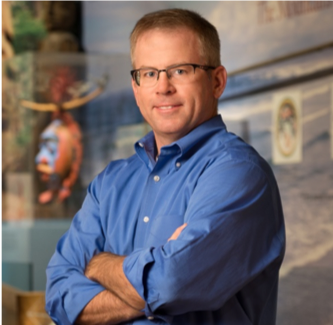 Stephen Nash, Director of Anthropology and the Avenir Conservation Center
Stephen Nash, Director of Anthropology and the Avenir Conservation Center
at the Denver Museum of Nature and Science, is an archaeologist, columnist, historian of science, and stand-up comedian. He is currently studying the Mogollon archaeology of southwestern New Mexico, Indian peace medals in the Museum’s Crane Collection, and the enchanting Russian gem carving sculptures of Vasily Konovalenko. He has written and edited seven books and dozens of peer-reviewed articles and published nearly 40 Curiosities columns for the SAPIENS online magazine. Prior to working at the Denver Museum, he served as head of collections in the Department of Anthropology at the Field Museum in Chicago.
Contact Michelle Jacobson
Email mjacobson@ioa.ucla.edu
Phone
Hybrid event – In-person at Digital Archaeology Lab A163 Fowler and Online (Zoom)
Reception: 12pm – Outdoor Fowler Amphitheater
The Database of Religious History (DRH) is an open access digital repository of information about the global history of religion. The data is gathered through expert-created entries that take the form of structured questionnaires or “polls”. The format of the queries ensures that both quantitative and qualitative information is gathered. This enables users to both browse through individual entries in a manner similar to encyclopedia entries, as well as manipulate and visualize the data in order to compare religious beliefs and practices across time and space.
In this workshop, DRH staff will provide an introduction to this resource and discuss new pedagogy packages and polls that will be of particular interest to archaeologists and those in the cultural heritage sector. We encourage instructors and graduate students from history, archaeology, and anthropology departments to attend and sign up as experts, as all global regions and time periods are of interest. We value the time and effort of our experts, and provide a $300 (CAD) honorarium for each completed entry. Each entry is also published through the University of British Columbia library and provided with a digital DOI. This is therefore a particularly excellent opportunity for graduate students to add a publication to their resume. During the workshop, interested experts will be able to start their entries and receive guidance from DRH staff. The workshop is hybrid, and interested attendees should register for their preferred method of attendance using the link provided above. A reception will follow at 12pm – which both in-person and online attendees are welcome to attend.

Contact Caroline Arbuckle
Email caroline.arbuckle@ubc.ca
Phone
Carolyn Dean
Department of History of Art & Visual Culture
University of California, Santa Cruz
Monday, April 25th at 12:00pm PT

Sponsors: Cotsen Institute of Archaeology and UCLA Latin American Institute
Contact Alba Menéndez Pereda and Elyse Brusher
Email albamenendez@ucla.edu and ebrusher@ucla.edu
Phone
- ‹ previous
- 13 of 50
- next ›



